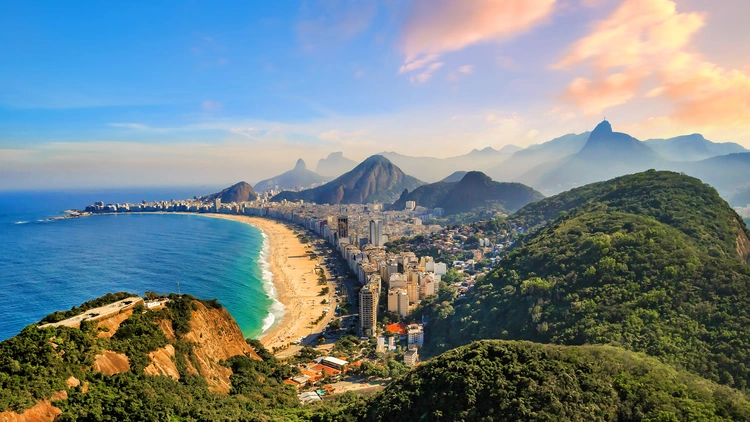
Only The Resilient Will Survive
We live in uncertain times.
Times of political turmoil, climate change, economic crisis, and war.
Only the strongest nations shall survive…
Or will they?
The reality is not what it seems.
The ability of a country to absorb shocks and survive is not always directly related to its wealth or military power.
The Simon Letter team and I have just completed an extensive round-the-world study that ranks and rates the best and worst countries to see out a global crisis.
Here’s a sneak peek at what we found…
In times of crisis, citizens, assets, and infrastructure are far more likely to be negatively affected in countries with “low resilience.”
Therefore, you can protect yourself by getting residency in a resilient country. A country that’s likely to be able to absorb large-scale shocks and survive—if not unscathed, then at least able to rebound quickly.
This begs the question: How do you measure a country’s ability to withstand crises?
In our comprehensive report… which is called The Simon Letter Global Survival Index 2024… a country’s resilience is measured by assessing a wide variety of parameters and considering how these impact upon each other.
When the COVID-19 pandemic struck, everyone assumed the United States would be best able to handle its impacts… and that West Africa would be devastated.
But the opposite happened.
West Africa saw only a fraction of the deaths and economic upheaval that the Western world did.
This, of course, was related to the nature of the crisis. Densely populated cities were more at risk… rather than rural or sparsely populated areas. The West also had more economic power to lose.
Not all crises and shocks are the same. When measuring resilience, we need to take account of a wide range of possible crises and in-country factors that affect the country’s ability to withstand crises.
The point is: Even the richest countries can be destabilized by crisis if they lack true resilience.
Go Offshore Today
Sign up to our free twice a week dispatch Offshore Living Letter
and immediately receive our FREE research report
on how to live tax-free today, while earning up to $215,200!
What Does It Mean For A Country To Be “Resilient”?
For a country to be resilient, it must be diversified. It must not primarily rely on one industry for its economic success.
If that industry fails—what then?
Countries that are dependent on a single industry, a single import source, or a single crop are the opposite of resilient—they are “fragile.”
Non-diverse countries are in severe danger if one of their pillars of stability fails.
This can cause a domino effect that collapses their entire society.
History is littered with examples of “invulnerable” empires and superpowers that were seemingly impervious to shocks, until they disintegrated, oftentimes practically overnight.
A resilient country can absorb the failure of one or more industries or even entire pillars of resilience and recover quickly because it is diversified.
The Most Important Resilience Indicator
What most people don’t realize is that the most important factor in long-term national resilience isn’t money or military might. It’s political stability.
If the “s*** hits the fan” you need the government to be strong and the people to trust them.
If not, you get anarchy.
This is proven when you see that many resource-rich countries are the most unstable and least resilient.
The Democratic Republic of Congo, Russia, and Venezuela are vastly resource-rich but are absolute basket cases when it comes to crisis management.
Go Offshore Today
Sign up to our free twice a week dispatch Offshore Living Letter
and immediately receive our FREE research report
on how to live tax-free today, while earning up to $215,200!
The Most Important Recovery Indicator
Our study found that the health of the business environment and a strong entrepreneurial mindset are the biggest factors in recovering after the upheaval of a major crisis.
Examples include Ireland’s double-digit recovery in economic growth post-COVID—double the EU average. Or Panama’s return to the strongest growth in the region after the pandemic, despite harsh lockdowns during COVID.
The Least Resilient Countries
Small countries with limited natural resources and high population densities are most in danger when a crisis strikes.
Haiti is a good example of this. It never recovered from the earthquake in 2010, and its political system has disintegrated into urban warfare and anarchy.
That said, small low-lying islands with no natural resources are the worst off of all.
Places like the Maldives might not even exist in 30 years because of rising sea levels, but conversely, vast areas of the Netherlands have safely existed below sea level for centuries, because they have a strong government, social cohesion, willingness to solve problems, and the resources to do so.
What Resilient Countries Could You Plant A Flag In?
Our focus always is on giving you practical, actionable information… and our message as a company is literally in the name: “Live And Invest Overseas.”
So, even a highly resilient country is not much use to you, dear reader, unless you can easily move there…
The trifecta for us is a country that’s not only highly resilient, but easy to gain residence in with a passive investment, and offers an appealing lifestyle.
These are all things we took into account when putting together The Simon Letter Global Survival Index 2024.
Like any such Index, ours is a mixture of science and judgment, the latter based on our many years of experience on the overseas living/investing beat.
The kind of judgments our readers rely on us to make—so they can stay informed, and use our insights to make their own decisions.
If you want to get your hands on a copy of this Index… become a Simon Letter member today.
Sincerely,
Con Murphy
Contributor, Simon Letter




